Engineering Design

Educators and Parents, Sign Up for The Cheat Sheet
Weekly updates to help you use Science News Explores in the learning environment
Thank you for signing up!
There was a problem signing you up.
-
 Environment
Environment‘Zombie’ wildfires can reemerge after wintering underground
Climate change may make these not-quite-dead blazes more common. Scientists are learning to predict where a zombie might emerge.
-
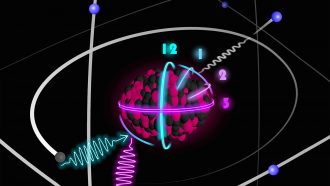 Physics
PhysicsNuclear clocks are nearly here
More precise clocks could improve technologies such as GPS and help scientists test major ideas in science.
-
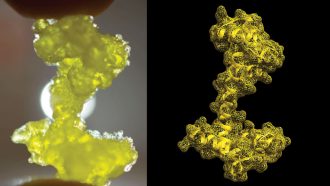 Chemistry
ChemistryFather-son bond inspires sweets that model the shapes of molecules
These bite-sized gummy candies could spark interest in the world of chemistry, especially among students who can’t see.
By Carmen Drahl -
 Health & Medicine
Health & MedicineWill we all need COVID-19 booster shots?
Experts say not yet, but booster vaccines may be coming as new SARS-CoV-2 virus variants keep emerging.
-
 Tech
TechSleep-friendlier lighting is on the way
Chemists have created a new glowing material for LEDs. It should lessen how much near-bedtime lighting impairs your ability to nod off.
By Manasee Wagh -
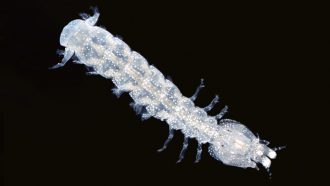 Tech
TechMantis shrimp inspires somersaults of new soft robot
Its rolling acrobatics allow this robot to move especially swiftly — much as a fictional new Disney character can.
-
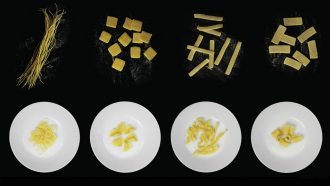 Materials Science
Materials Science‘Smart’ pasta morphs into fun shapes as it cooks
The trick to this shape-shifting are grooves cut into the raw pasta. Those grooves affect how the noodles swell as they cook.
-
 Environment
EnvironmentPond scum can release a paralyzing pollutant into the air
New study finds blooms of blue-green algae can seed the air with a poisonous pollutant.
-
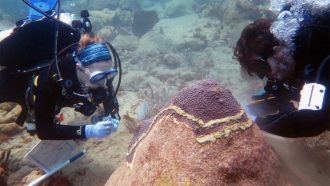 Animals
AnimalsA common antibiotic might save some sick corals
The antibiotic amoxicillin stopped tissue death in corals for at least 11 months after treatment.
-
 Climate
ClimateClimate may have sent drift of the North Pole toward Greenland
This mid-1990s shift in the pole’s movement was driven by glacial melt. And that was triggered in part by climate change, a new study reports.
By Sid Perkins -
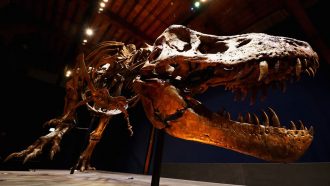 Animals
AnimalsThe secret to T. rex‘s incredible biting force is at last revealed
The force of a T. rex bite was roughly 6 metric tons. A new study points to what’s behind that mighty force.
By Sid Perkins -
 Earth
EarthOnly 3 percent of Earth’s land is unchanged by people
A sweeping survey of land-based ecosystems finds that very few still support all the animals they used to. Reintroducing lost species could help.